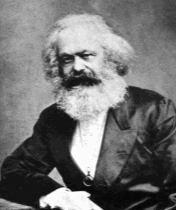|
Excerpts from V. S. Semenov, Dialektika razvitiia sotsializma
[Dialectics of Socialist Development],
Moscow: “Mysl’,” 1987
This work is noteworthy particularly for its rejection of the concepts of
antagonistic and
non-antagonistic contradictions. --trans.
[196] But the point is that antagonism is not analogous to dialectical contradiction. In a
dialectical contradiction of opposites is expressed the inner, essential condition of some
phenomenon, while antagonism express the occurrence of confrontation, resistance of
opposite social, socio-economic, and socio-political forces, social classes, social strata an
groups, on the basis of such contradictions in social life.
[197] Here are the essential and substantial characteristics of antagonism. First, it is not
individual, put social antagonism. Second, it is manifested in relationships as particular,
specific forms of the development of social production. Third, social antagonism has a
historically transitory character, originating with the phenomenon of private-property-
owning, exploiting society, and disappearing with the destruction fo the last such type of
society--capitalist society.... In exploiter society, antagonism expresses the main mode of
its basic dialectical contradiction in social areas.
[198] The presence of the struggle of opposites includes the formal coincidence of
dialectical contradiction and antagonism. But in general it should not be possible to identify
them, as is done rather often. Between dialectical contradiction and social antagonism,
there exist essential and derivative relations, inner causes and social effects. Indeed by
means of the resolution of social class antagonism between the bourgeoisie and the
proletariat as a result of class struggle and socialist revolution the contradiction between
social production and private appropriation is resolved. In its turn, on the basis of the
resolution of the given deep inner dialectical contradiction, both of the opposite sides of the
social class antagonism are eliminated: the bourgeois class and all other exploiting
elements are eliminated, and the proletariat is qualitatively transformed into the ruling,
leading class of socialist society.
Consequently, the struggle of social forces having causing the given deep dialectical
contradiction is resolved, and the resolution of that contradiction leads to the removal also
of social antagonism. Having been resolved, the dialectical contradiction changes into a
qualitatively different content, displaying unity and struggle in the conditions that have
arisen of social ownership of the means of production, but not reproducing in this any
social class antagonism, which comes to an end under socialist conditions. Thereby the
social dialectic is cleansed of antagonisms.
This means that between dialectical contradiction and social antagonism, there are
essential differences of general and particular, universal and specific, inner content and
external form, essential and derivative, inner cause and social environment, historically
permanent (non-transitory) and historically transitory. As Lenin wrote, Marxist theory
“directly sets itself the task of revealing all forms of antagonism [199] and exploitation in
contemporary society, tracing their evolution, indicating their transitional character, avoiding
showing them in other forms.”
*
Such essential qualitative demarcations of dialectical contradictions and social
antagonism excludes the possibility of applying them to one another and spreading specific
features of antagonism into the universal-general and essential, deep character of
dialectical contradictions. This means that a dialectical contradiction cannot be
characterized as an “antagonistic contradiction” or as a “non-antagonistic contradiction.”
It is remarkable that the works of K. Marks, F. Engels, and V. I. Lenin do not contain the
expressions “antagonistic contradiction” or “non-antagonistic contradiction,” to which many
authors are attracted.
We share the position of those Soviet authors and philosophers from the socialist
countries who employ the concepts “contradiction” and “antagonism,” but do not unite
those concepts [1]
. (In this connection it must be said that in a series of earlier publications, the author,
together with many Soviet scholars, used the concepts of “non-antagonistic” and
“antagonistic” contradiction). With regard to the point of view of scholars distinguishing
dialectical contradiction and antagonism, or uniting them by using the concepts of
“antagonistic contradiction” and “non-antagonistic contradiction,” the present position is
most fully set out in the work of A. A. Khamidov.[2]
In a thorough analysis of the present
problem, he sets out the view that “dialectical contradiction and antagonism are
phenomena of a different order,” that the expression “antagonistic contradiction” “plainly
does not occur” in the classic works. “There are none in the works of Marx and Engels, nor
in the works of Lenin, nor even in the Plekhanov’s works.” [3]
In the conditions of the new society, there is no transition of dialectical contradictions
from “antagonistic contradictions” to “non-antagonistic contradictions,” but rather the
liberation of dialectical contradiction from the social antagonisms that accompany them in
exploitative society. Dialectical contradiction appears in is proper, “pure,” essential type,
without any additional particular antagonistic form and concrete antagonistic manifestation,
and on a qualitatively new level, as a united [200] and universal impulse of social self-movement.
The inner source and common initial motive force of social development in socialist
conditions is only a dialectical contradiction in a qualitatively new condition, but still not
anything analogous to “non-antagonistic contradiction.”
Notes
[1] For example, G. S. Basishchev, "Protivorechie i antagonizm [contradiction and antagonism]," Problemy dialektiki, vyp. III: Voprosy dialektica materialisticheskoi teorii protivorechia, Leningrad, 1973.
[2] See A. A. Khamidov, "Kategoriia dialekticheskogo protivorechiia i antagonizma [The categories of dialectical contradiction and antagonism]," Printsip protivorechiia v sotsial'nom poznanii, Alma-Ata, 1982, pp. 51-139.
[3] ibid.
|


